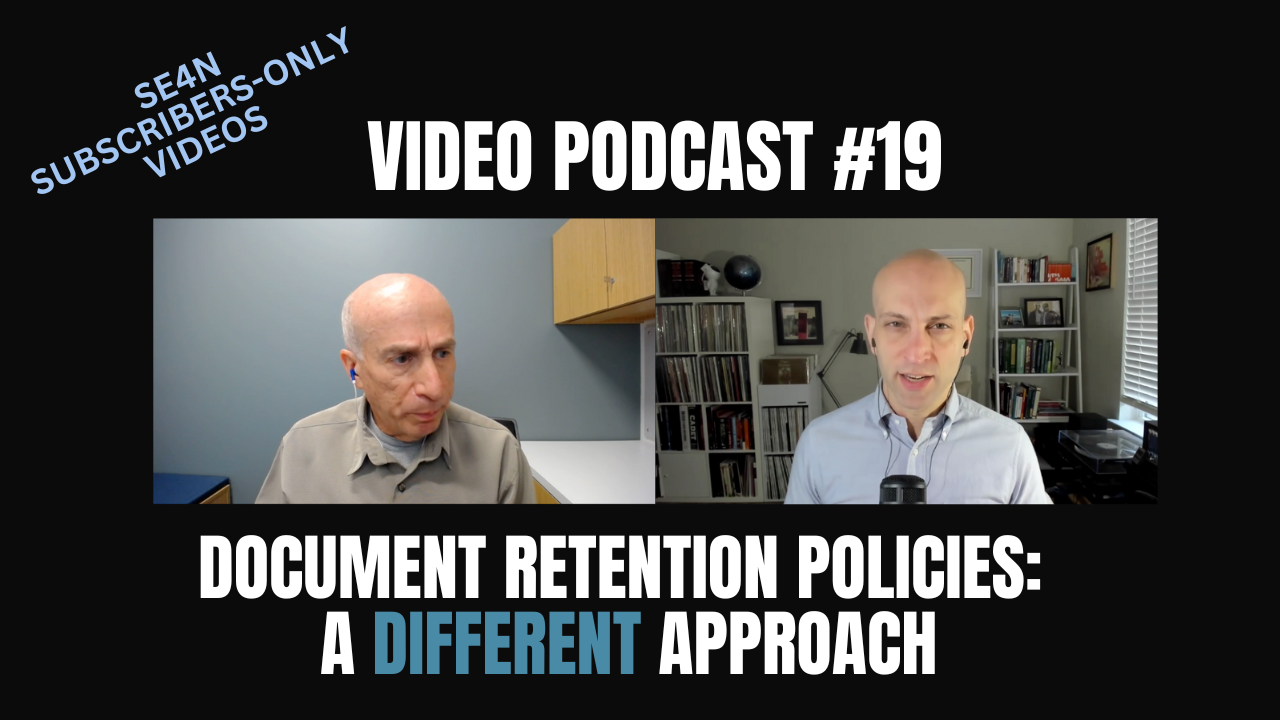
Blog.
Most Recent Posts

VIDEO Q&A for Subscribers: July 2025
Ben and Mike answer questions from subscribers about what to do when a capital campaign falls short of its goal, whether a 501(c)(3) organization can have only one Board member, getting back into compliance with the organization's investment policy, and whether unpaid internships raise conflict of interest issues.

Video Podcast: Making Document Retention and Destruction Policies Less Burdensome
Ben and Mike discuss document retention and destruction policies, the reasons why many common basic templates are very burdensome and lead to inconsistent implementation and other problems, the different approach we use in our policy template, considerations relating to electronic storage, and more.
![TEMPLATE: Document Retention and Destruction Policy [SUBSCRIBERS-ONLY]](https://images.squarespace-cdn.com/content/v1/5e6ccadfb4659c1d51df14d5/564fea5e-4ef8-495c-8b27-5528219c0eaf/shredder-779850_1920.jpg)
TEMPLATE: Document Retention and Destruction Policy [SUBSCRIBERS-ONLY]
This Document Retention and Destruction Policy template is intended to help your nonprofit organization ensure compliance with the Sarbanes-Oxley Act and other applicable record-keeping laws, and to avoid inadvertent destruction of important organizational records. Unlike many other document retention and destruction policies (sometimes called “record retention policies”) that specify difficult-to-track holding periods (3 years, 7 years, 10 years, etc.) for specific categories of documents, this template uses a more flexible approach that aims to minimize administrative and operational burdens while addressing key compliance issues.

Adding Spending Provisions to an Operating Reserve Policy
Virtually all nonprofit organizations aspire to accumulate operating reserves to help bridge short-term disruptions and funding gaps and to provide working capital for the future. What most people do not think about is how these operating reserves could be used or spent when the need arises. Misunderstandings can be avoided by making sure your organization’s operating reserve policy has provisions for the future allowable use (spending) of operating reserves.
![TEMPLATE: Whistleblower Policy [SUBSCRIBERS-ONLY]](https://images.squarespace-cdn.com/content/v1/5e6ccadfb4659c1d51df14d5/64a1a459-1737-4c60-aa99-12b3096042fd/pexels-eva-bronzini-7965294.jpg)
TEMPLATE: Whistleblower Policy [SUBSCRIBERS-ONLY]
This Whistleblower Policy template is intended to help your nonprofit organization establish a process for Board members, staff, and others to report potential violations internally in good faith without fear of retaliation. This sample document includes basic language addressing the mechanism for reporting and investigating whistleblower claims, the prohibition on retaliation, and other provisions to help ensure compliance with the Sarbanes-Oxley Act and demonstrate your organization’s commitment to transparency, accountability, and good governance.

Operating Reserves as a Key Indicator of Financial Health
Just as the gauges on a car’s dashboard provide crucial information about its performance and physical condition, operating reserves serve as a vital indicator of a nonprofit organization’s financial health and as a measure of stability. Operating reserves give a clear view of an organization’s capacity to sustain its operations and weather financial uncertainties. By understanding and managing operating reserves, nonprofit leaders can navigate their organizations toward greater longevity and stability, ensuring they remain trusted and impactful stewards of their missions for years to come.

Q&A #167 – Does the Board of Directors have a responsibility to review staff policies?
The chief executive of a nonprofit organization usually has the primary responsibility for managing staff and human resources issues, including the development and implementation of most employee handbook policies. With some exceptions, nonprofit Boards are not expected to review and approve staff policies, but the Board’s oversight role includes a duty to take reasonable steps to confirm these policies are in place and updated periodically.
![VIDEO Q&A for Subscribers: September 2024 [SUBSCRIBERS-ONLY]](https://images.squarespace-cdn.com/content/v1/5e6ccadfb4659c1d51df14d5/f0598e46-14f4-464c-8b03-5ce99563762d/SE4N+Video+Q%26A+2024-09.png)
VIDEO Q&A for Subscribers: September 2024 [SUBSCRIBERS-ONLY]
Ben and Mike answer questions from subscribers about whether nonprofit organizations should require employees and Board members to provide receipts for small dollar expense reimbursements, tips for properly using executive sessions in Board of Directors meetings, and issues raised by nonprofits providing capacity building support to other nonprofits.

TEMPLATE: Code of Ethics
A Code of Ethics is one of the fundamental governance policies that all nonprofit organizations should have, and an important complement to your organization’s conflict of interest policy. This Code of Ethics template is intended to help your organization identify and express the core principles and ethical requirements with which all Board members, staff, and other individuals who serve and/or represent the organization are expected to comply.
![VIDEO Q&A for Subscribers: June 2024 [SUBSCRIBERS-ONLY]](https://images.squarespace-cdn.com/content/v1/5e6ccadfb4659c1d51df14d5/682f6ab6-6720-4d11-963f-45e952c5552b/SE4N+Video+Q%26A+2024-06.png)
VIDEO Q&A for Subscribers: June 2024 [SUBSCRIBERS-ONLY]
Ben and Mike answer questions from subscribers about the responsibility of a Board of Directors to fill vacancies and how vacancy appointments count towards term limits, the Board's responsibilities regarding the use of large unexpected gifts and bequests, whether Board service can be reported as an in-kind contribution, and the distinction between policies and procedures that apply to Board and the staff.

TEMPLATE: Current Operating and Intermediate Funds Cash Management Guidelines
This Cash Management Guidelines template is designed to help your organization set targets the management of both current operating funds and intermediate funds, establish investment guidelines consist with your organization’s cash management needs.

Why Gift Acceptance Policies are Important and Must Be Periodically Reviewed and Updated
A gift acceptance policy fills many important roles for a nonprofit organization, including acting as a set of guidelines for fundraising efforts, a tool for risk management, and a protector of the organization’s good governance practices, mission, ethics, reputation, and culture. These characteristics are naturally sensitive to unexpected change and evolving economic conditions, so regularly reviewing and updating your organization’s gift acceptance policy is essential.

VIDEO PODCAST: The Downsides of Board “Give or Get” Policies
Mike and Ben discuss Board giving policies, including why nonprofit organizations have them, the components of a formal Board giving policy, and the often overlooked complications and negative consequences of Board giving policies with a "give or get" option.

The Case Against Board “Give or Get” Policies for a Nonprofit Organization
For nonprofit organizations, especially public charities, individual Board member giving is almost always a sensitive subject. Board giving is usually an important benchmark for nonprofits and frequently is treated as a “badge of honor” when an organization can report that 100% of its Board members have made an annual contribution. Board “give or get” policies may help some organizations reach Board giving goals, but they are complex and often hard to enforce, quantify, and manage.

Q&A #154 – Are nonprofits required to have a document retention and destruction policy?
Sections 802 and 1102 of the Sarbanes-Oxley Act generally prohibit all persons, including nonprofit organizations, from destroying, falsifying, or otherwise modifying records to obstruct a federal proceeding or investigation. There is no specific requirement under federal law to have a document retention and destruction policy (sometimes called a record retention policy), but having one is a recommended best practice to prevent violations of this law and to demonstrate the organization’s commitment to transparency and accountability.